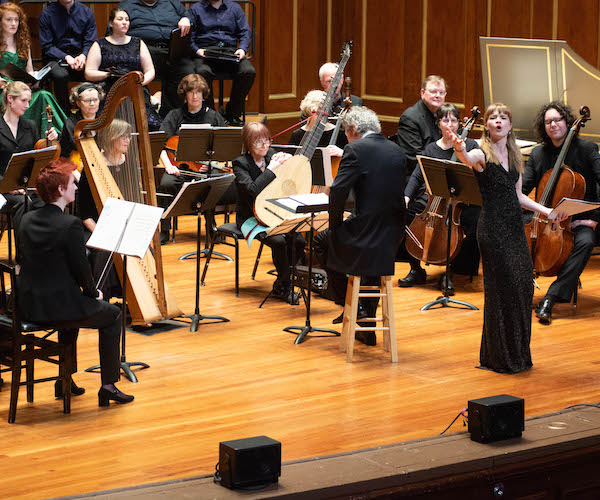Concert Review: Handel & Haydn Society Plays Purcell’s “The Fairy Queen”
A thoroughly charismatic Fairy Queen from start to finish, well-prepared, fulgently delivered, and received by a packed house with well-earned warmth.

A scene from Handel & Haydn’s production of “The Fairy Queen.” Antonia Christophers as the Narrator. Photo: Lara Silberklang.
By Jonathan Blumhofer
The Handel & Haydn Society (HHS) brought Henry Purcell’s The Fairy Queen to Jordan Hall this past weekend for the ensemble’s penultimate concert series of the season.
Premiered in 1692, The Fairy Queen isn’t an opera in the modern sense (or even the Baroque one). Rather, it’s comprised of a set of masques, which are scenes with music that were, in the day, interpolated into spoken plays.
The play in this instance was Shakespeare’s A Midsummer Night’s Dream in an anonymous adaptation that added new scenes and complexities to the original; the handful of texts Purcell set are by this unknown new author, not the Bard. Originally, the whole extravaganza clocked in at over five hours, though HHS’s production trimmed that down to a much more manageable two-and-a-half, counting intermission.
Nevertheless, Purcell’s music for The Fairy Queen is terrifically vibrant and fresh, often full of surprises. There are rich, chromatic moments that anticipate Dido and Aeneas, as well as evocative intimations of nature; throughout, his writing is driven by a strong sense of rhythm and an almost gleeful embrace of contrasting instrumental colors.
This weekend’s performances (I caught Sunday’s closing one) captured the music’s brilliance with easy, confident panache.
Presiding over them was actress Antonia Christophers, who proved a witty, knowing guide to the action, reciting a nifty summation of the plot and offering a few recitations direct from the play as the story proceeded. She joined in, too, with the cast of vocalists to sing the work’s concluding chorus.
And what an assortment of voices HHS had on display. The institution’s chorus is one of the city’s musical crown jewels: they consistently sing with tonal warmth, excellent blend, note-perfect intonation, and bitingly-clear diction. It helps, no doubt, that the chorus’s ranks are comprised, in the main, of talented, young singers who often do double-duty as soloists (as they did this weekend). That they sing with such distinction both individually and corporately, though, is really remarkable.
Suffice it to say, there were no weak vocal links on Sunday afternoon. Quite the contrary: there were an abundance of riches.
Soprano Sarah Brailey brought a dusky intensity to her several solos, especially Act 2’s “Night,” with its ethereal, floating textures. Margot Rood sang with clarion tone, breathtaking agility, and terrific rhythmic intensity (the “trip it” refrains in her Act 2 song were marvelously pert). Also, intense emotion: “O let me weep,” Act 5’s shattering meditation on lost love, was easily the afternoon’s most heartrending solo.
Sarah Yanovich and Sonja DuToit Tengblad impressed in their solo and ensemble numbers, the latter delivering some particularly impressive melismas in her Act 5 aria as the goddess, Juno.
The Handel and Haydn Society's chorus is one of Boston's musical crown jewels.Click To TweetAmong the men, bass-baritone Matthew Brook confidently executed three roles: the drunken poet (in Act 1), Coridon (in Act 3), and Hymen (in Act 5). He sang each with fervent tone and much spirit, engaging in some ribald play with countertenor Charles Humphries’ cross-dressing Mopsa during the third act. But best were his Act 2 aria, “Hush, no more, be silent all,” and Act 4’s “Winter,” in both of which Brook’s true pitch and minimal vibrato allowed him to capably and colorfully navigated the music’s weird, unsettled chromatic turns.
Humphries, filling in for an indisposed Robin Blaze, got off to a bit of an indistinct start: his opening “One charming night” took some time to find its footing. But it eventually did and his subsequent appearances (not least as Mopsa) were each robustly sung.
Tenor Brian Giebler left a strong impression with his Act 2 song, “Come all ye songsters of the sky,” singing with clear, bell-like tone, and Jonas Budris made for a powerful Phoebus in Act 4. Woodrow Bynum and Stefan Reed were equally fine in their moments across Acts 1, 3, and 4.
Throughout the afternoon, HHS artistic director Harry Christophers drew a crackling performance of Purcell’s score from the HHS period-instrument orchestra. Tempos were fleet and lively, and the conductor’s interpretation never lost sight of the dancing impetus behind nearly all of the Purcell’s writing in it.
Additionally, the music’s many colorful touches – from the recorder imitations of birdcalls at the beginning of Act 2 to the hued percussion in Act 3’s rustic masque and the brassy, martial outbursts of the Act 4 Symphony – were vividly etched. Jonathan Hess was the afternoon’s excellent percussionist, while Paula Chateauneuf’s theorbo and guitar contributions added a picturesque luster to the ensemble’s reading. So, too, did the mighty trumpet interjections from John Thiessen and Jesse Levine.
Sunday’s was, in all then, a thoroughly charismatic Fairy Queen from start to finish, well-prepared, fulgently delivered, and received by a packed house with well-earned warmth.
Jonathan Blumhofer is a composer and violist who has been active in the greater Boston area since 2004. His music has received numerous awards and been performed by various ensembles, including the American Composers Orchestra, Kiev Philharmonic, Camerata Chicago, Xanthos Ensemble, and Juventas New Music Group. Since receiving his doctorate from Boston University in 2010, Jon has taught at Clark University, Worcester Polytechnic Institute, and online for the University of Phoenix, in addition to writing music criticism for the Worcester Telegram & Gazette.
Tagged: Handel & Haydn Society, Harry Christophers, Henry-Purcell, Opera
